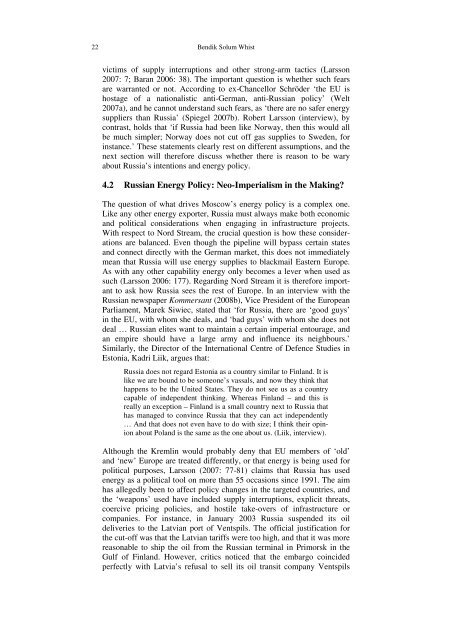Nord Stream: Not Just a Pipeline
Nord Stream: Not Just a Pipeline
Nord Stream: Not Just a Pipeline
You also want an ePaper? Increase the reach of your titles
YUMPU automatically turns print PDFs into web optimized ePapers that Google loves.
22 Bendik Solum Whist<br />
victims of supply interruptions and other strong-arm tactics (Larsson<br />
2007: 7; Baran 2006: 38). The important question is whether such fears<br />
are warranted or not. According to ex-Chancellor Schröder ‘the EU is<br />
hostage of a nationalistic anti-German, anti-Russian policy’ (Welt<br />
2007a), and he cannot understand such fears, as ‘there are no safer energy<br />
suppliers than Russia’ (Spiegel 2007b). Robert Larsson (interview), by<br />
contrast, holds that ‘if Russia had been like Norway, then this would all<br />
be much simpler; Norway does not cut off gas supplies to Sweden, for<br />
instance.’ These statements clearly rest on different assumptions, and the<br />
next section will therefore discuss whether there is reason to be wary<br />
about Russia’s intentions and energy policy.<br />
4.2 Russian Energy Policy: Neo-Imperialism in the Making?<br />
The question of what drives Moscow’s energy policy is a complex one.<br />
Like any other energy exporter, Russia must always make both economic<br />
and political considerations when engaging in infrastructure projects.<br />
With respect to <strong>Nord</strong> <strong>Stream</strong>, the crucial question is how these considerations<br />
are balanced. Even though the pipeline will bypass certain states<br />
and connect directly with the German market, this does not immediately<br />
mean that Russia will use energy supplies to blackmail Eastern Europe.<br />
As with any other capability energy only becomes a lever when used as<br />
such (Larsson 2006: 177). Regarding <strong>Nord</strong> <strong>Stream</strong> it is therefore important<br />
to ask how Russia sees the rest of Europe. In an interview with the<br />
Russian newspaper Kommersant (2008b), Vice President of the European<br />
Parliament, Marek Siwiec, stated that ‘for Russia, there are ‘good guys’<br />
in the EU, with whom she deals, and ‘bad guys’ with whom she does not<br />
deal … Russian elites want to maintain a certain imperial entourage, and<br />
an empire should have a large army and influence its neighbours.’<br />
Similarly, the Director of the International Centre of Defence Studies in<br />
Estonia, Kadri Liik, argues that:<br />
Russia does not regard Estonia as a country similar to Finland. It is<br />
like we are bound to be someone’s vassals, and now they think that<br />
happens to be the United States. They do not see us as a country<br />
capable of independent thinking. Whereas Finland – and this is<br />
really an exception – Finland is a small country next to Russia that<br />
has managed to convince Russia that they can act independently<br />
… And that does not even have to do with size; I think their opinion<br />
about Poland is the same as the one about us. (Liik, interview).<br />
Although the Kremlin would probably deny that EU members of ‘old’<br />
and ‘new’ Europe are treated differently, or that energy is being used for<br />
political purposes, Larsson (2007: 77-81) claims that Russia has used<br />
energy as a political tool on more than 55 occasions since 1991. The aim<br />
has allegedly been to affect policy changes in the targeted countries, and<br />
the ‘weapons’ used have included supply interruptions, explicit threats,<br />
coercive pricing policies, and hostile take-overs of infrastructure or<br />
companies. For instance, in January 2003 Russia suspended its oil<br />
deliveries to the Latvian port of Ventspils. The official justification for<br />
the cut-off was that the Latvian tariffs were too high, and that it was more<br />
reasonable to ship the oil from the Russian terminal in Primorsk in the<br />
Gulf of Finland. However, critics noticed that the embargo coincided<br />
perfectly with Latvia’s refusal to sell its oil transit company Ventspils













